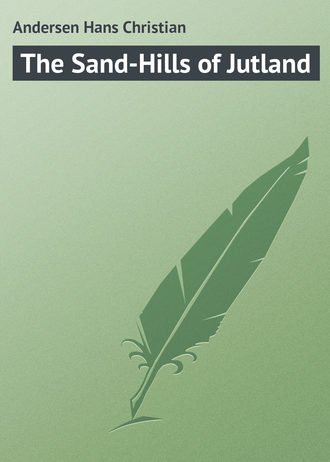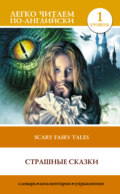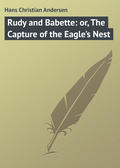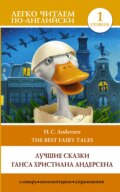
Ганс Христиан Андерсен
The Sand-Hills of Jutland
The Girl who Trod upon Bread
You have doubtless heard of the girl who trod upon bread, not to soil her pretty shoes, and what evil this brought upon her. The tale is both written and printed.
She was a poor child, but proud and vain. She had a bad disposition, people said. When she was little more than an infant it was a pleasure to her to catch flies, to pull off their wings, and maim them entirely. She used, when somewhat older, to take lady-birds and beetles, stick them all upon a pin, then put a large leaf or a piece of paper close to their feet, so that the poor things held fast to it, and turned and twisted in their endeavours to get off the pin.
"Now the lady-birds shall read," said little Inger. "See how they turn the paper!"
As she grew older she became worse instead of better; but she was very beautiful, and that was her misfortune. She would have been punished otherwise, and in the long run she was.
"You will bring evil on your own head," said her mother.
"As a little child you used often to tear my aprons; I fear that when you are older you will break my heart."
And she did so sure enough.
At length she went into the country to wait on people of distinction. They were as kind to her as if she had been one of their own family; and she was so well dressed that she looked very pretty, and became extremely arrogant.
When she had been a year in service her employers said to her, —
"You should go and visit your relations, little Inger."
She went, resolved to let them see how fine she had become. When, however, she reached the village, and saw the lads and lasses gossiping together near the pond, and her mother sitting close by on a stone, resting her head against a bundle of firewood which she had picked up in the forest, Inger turned back. She felt ashamed that she who was dressed so smartly should have for her mother such a ragged creature, one who gathered sticks for her fire. It gave her no concern that she was expected – she was so vexed.
A half year more had passed.
"You must go home some day and see your old parents, little Inger," said the mistress of the house. "Here is a large loaf of white bread – you can carry this to them; they will be rejoiced to see you."
And Inger put on her best clothes and her nice new shoes, and she lifted her dress high, and walked so carefully, that she might not soil her garments or her feet. There was no harm at all in that. But when she came to where the path went over some damp marshy ground, and there were water and mud in the way, she threw the bread into the mud, in order to step upon it and get over with dry shoes; but just as she had placed one foot on the bread, and had lifted the other up, the bread sank in with her deeper and deeper, till she went entirely down, and nothing was to be seen but a black bubbling pool.
That is the story.
What became of the girl? She went below to the Old Woman of the Bogs, who brews down there. The Old Woman of the Bogs is an aunt of the fairies. They are very well known. Many poems have been written about them, and they have been printed; but nobody knows anything more of the Old Woman of the Bogs than that, when the meadows and the ground begin to reek in summer, it is the old woman below who is brewing. Into her brewery it was that Inger sank, and no one could hold out very long there. A cesspool is a charming apartment compared with the old Bog-woman's brewery. Every vessel is redolent of horrible smells, which would make any human being faint, and they are packed closely together and over each other; but even if there were a small space among them which one might creep through, it would be impossible, on account of all the slimy toads and snakes that are always crawling and forcing themselves through. Into this place little Inger sank. All this nauseous mess was so ice-cold that she shivered in every limb. Yes, she became stiffer and stiffer. The bread stuck fast to her, and it drew her as an amber bead draws a slender thread.
The Old Woman of the Bogs was at home. The brewery was that day visited by the devil and his dam, and she was a venomous old creature who was never idle. She never went out without having some needlework with her. She had brought some there. She was sewing running leather to put into the shoes of human beings, so that they should never be at rest. She embroidered lies, and worked up into mischief and discord thoughtless words, that would otherwise have fallen to the ground. Yes, she knew how to sew and embroider, and transfer with a vengeance, that old grandam!
She beheld Inger, put on her spectacles, and looked at her.
"That is a girl with talents," said she. "I shall ask for her as a souvenir of my visit here; she may do very well as a statue to ornament my great-grandchildren's antechamber;" and she took her.
It was thus little Inger went to the infernal regions. People do not generally go straight through the air to them: they can go by a roundabout path when they know the way.
It was an antechamber in an infinity. One became giddy there at looking forwards, and giddy at looking backwards, and there stood a crowd of anxious, pining beings, who were waiting and hoping for the time when the gates of grace should be opened. They would have long to wait. Hideous, large, waddling spiders wove thousands of webs over their feet; and these webs were like gins or foot-screws, and held them as fast as chains of iron, and were a cause of disquiet to every soul – a painful annoyance. Misers stood there, and lamented that they had forgotten the keys of their money chests. It would be too tiresome to repeat all the complaints and troubles that were poured forth there. Inger thought it shocking to stand there like a statue: she was, as it were, fastened to the ground by the bread.
"This comes of wishing to have clean shoes," said she to herself. "See how they all stare at me!"
Yes, they did all stare at her; their evil passions glared from their eyes, and spoke, without sound, from the corner of their mouths: they were frightful.
"It must be a pleasure to them to see me," thought little Inger. "I have a pretty face, and am well dressed;" and she dried her eyes. She had not lost her conceit. She had not then perceived how her fine clothes had been soiled in the brewhouse of the Old Woman of the Bogs. Her dress was covered with dabs of nasty matter; a snake had wound itself among her hair, and it dangled over her neck; and from every fold in her garment peeped out a toad, that puffed like an asthmatic lap-dog. It was very disagreeable. "But all the rest down here look horrid too," was the reflection with which she consoled herself.
But the worst of all was the dreadful hunger she felt. Could she not stoop down and break off a piece of the bread on which she was standing? No; her back was stiffened; her hands and her arms were stiffened; her whole body was like a statue of stone; she could only move her eyes, and these she could turn entirely round, and that was an ugly sight. And flies came and crept over her eyes backwards and forwards. She winked her eyes; but the intruders did not fly away, for they could not – their wings had been pulled off. That was another misery added to the hunger – the gnawing hunger that was so terrible to bear!
"If this goes on I cannot hold out much longer," she said.
But she had to hold out, and her sufferings became greater.
Then a warm tear fell upon her head. It trickled over her face and her neck, all the way down to the bread. Another tear fell, then many followed. Who was weeping over little Inger? Had she not a mother up yonder on the earth? The tears of anguish which a mother sheds over her erring child always reach it; but they do not comfort the child – they burn, they increase the suffering. And oh! this intolerable hunger; yet not to be able to snatch one mouthful of the bread she was treading under foot! She became as thin, as slender as a reed. Another trial was that she heard distinctly all that was said of her above on the earth, and it was nothing but blame and evil. Though her mother wept, and was in much affliction, she still said, —
"Pride goes before a fall. That was your great fault, Inger. Oh, how miserable you have made your mother!"
Her mother and all who were acquainted with her were well aware of the sin she had committed in treading upon bread. They knew that she had sunk into the bog, and was lost; the cowherd had told that, for he had seen it himself from the brow of the hill.
"What affliction you have brought on your mother, Inger!" exclaimed her mother. "Ah, well! I expected no better from you."
"Would that I had never been born!" thought Inger; "that would have been much better for me. My mother's whimpering can do no good now."
She heard how the family, the people of distinction who had been so kind to her, spoke. "She was a wicked child," they said; "she valued not the gifts of our Lord, but trod them under her feet. It will be difficult for her to get the gates of grace open to admit her."
"They ought to have brought me up better," thought Inger. "They should have taken the whims out of me, if I had any."
She heard that there was a common ballad made about her, "the bad girl who trod upon bread, to keep her shoes nicely clean," and this ballad was sung from one end of the country to the other.
"That any one should have to suffer so much for such as that – be punished so severely for such a trifle!" thought Inger. "All these others are punished justly, for no doubt there was a great deal to punish; but ah, how I suffer!"
And her heart became still harder than the substance into which she had been turned.
"No one can be better in such society. I will not grow better here. See how they glare at me!"
And her heart became still harder, and she felt a hatred towards all mankind.
"They have a nice story to tell up there now. Oh, how I suffer!"
She listened, and heard them telling her history as a warning to children, and the little ones called her "ungodly Inger." "She was so naughty," they said, "so very wicked, that she deserved to suffer."
The children always spoke harshly of her. One day, however, that hunger and misery were gnawing her most dreadfully, and she heard her name mentioned, and her story told to an innocent child – a little girl – she observed that the child burst into tears in her distress for the proud, finely-dressed Inger.
"But will she never come up again?" asked the child.
The answer was, —
"She will never come up again."
"But if she will beg pardon, and promise never to be naughty again?"
"But she will not beg pardon," they said.
"Oh, how I wish she would do it!" sobbed the little girl in great distress. "I will give my doll, and my doll's house too, if she may come up! It is so shocking for poor little Inger to be down there!"
These words touched Inger's heart; they seemed almost to make her good. It was the first time any one had said "poor Inger," and had not dwelt upon her faults. An innocent child cried and prayed for her. She was so much affected by this that she felt inclined to weep herself; but she could not, and this was an additional pain.
Years passed on in the earth above; but down where she was there was no change, except that she heard more and more rarely sounds from above, and that she herself was more seldom mentioned. At last one day she heard a sigh, and "Inger, Inger, how miserable you have made me! I foretold that you would!" These were her mother's last words on her deathbed.
And again she heard herself named by her former employers, and her mistress said, —
"Perhaps I may meet you once more, Inger. None know whither they are to go."
But Inger knew full well that her excellent mistress would never come to the place where she was.
Time passed on, and on, slowly and wretchedly. Then once more Inger heard her name mentioned, and she beheld as it were, directly above her, two clear stars shining. These were two mild eyes that were closing upon earth. So many years had elapsed since a little girl had cried in childish sorrow over "poor Inger," that that child had become an old woman, whom our Lord was now about to call to himself. At that hour, when the thoughts and the actions of a whole life stand in review before the parting soul, she remembered how, as a little child, she had wept bitterly on hearing the history of Inger. That time, and those feelings, stood so prominently before the old woman's mind in the hour of death, that she cried with intense emotion, —
"Lord, my God! have not I often, like Inger, trod under foot Thy blessed gifts, and placed no value on them? Have I not often been guilty of pride and vanity in my secret heart? But Thou, in Thy mercy, didst not let me sink; Thou didst hold me up. Oh, forsake me not in my last hour!"
And the aged woman's eyes closed, and her spirit's eyes opened to what had been formerly invisible; and as Inger had been present in her latest thoughts, she beheld her, and perceived how deep she had been dragged downwards. At that sight the gentle being burst into tears; and in the kingdom of heaven she stood like a child, and wept for the fate of the unfortunate Inger. Her tears and her prayers sounded like an echo down in the hollow form that confined the imprisoned, miserable soul. That soul was overwhelmed by the unexpected love from those realms afar. One of God's angels wept for her! Why was this vouchsafed to her? The tortured spirit gathered, as it were, into one thought, all the actions of its life – all that it had done; and it shook with the violence of its remorse – remorse such as Inger had never felt. Grief became her predominating feeling. She thought that for her the gates of mercy would never open, and as in deep contrition and self-abasement she thought thus, a ray of brightness penetrated into the dismal abyss – a ray more vivid and glorious than the sunbeams which thaw the snow figures that the children make in their gardens. And this ray, more quickly than the snow-flake that falls upon a child's warm mouth can be melted into a drop of water, caused Inger's petrified figure to evaporate, and a little bird arose, following the zigzag course of the ray, up towards the world that mankind inhabit. But it seemed afraid and shy of everything around it; it felt ashamed of itself; and apparently wishing to avoid all living creatures, it sought, in haste, concealment in a dark recess in a crumbling wall. Here it sat, and it crept into the farthest corner, trembling all over. It could not sing, for it had no voice. For a long time it sat quietly there before it ventured to look out and behold all the beauty around. Yes, it was beauty! The air was so fresh, yet so soft; the moon shone so clearly; the trees and the flowers scented so sweetly; and it was so comfortable where she sat – her feather garb so clean and nice! How all creation told of love and glory! The grateful thoughts that awoke in the bird's breast she would willingly have poured forth in song, but the power was denied to her. Yes, gladly would she have sung as do the cuckoo and the nightingale in spring. Our gracious Lord, who hears the mute worm's hymn of praise, understood the thanksgiving that lifted itself up in the tones of thought, as the psalm floated in David's mind before it resolved itself into words and melody.
As weeks passed on these unexpressed feelings of gratitude increased. They would surely find a voice some day, with the first stroke of the wing, to perform some good act. Might not this happen?
Now came the holy Christmas festival. The peasants raised a pole close by the old wall, and bound an unthrashed bundle of oats on it, that the birds of the air might also enjoy the Christmas, and have plenty to eat at that time which was held in commemoration of the redemption brought to mankind.
And the sun rose brightly that Christmas morning, and shone upon the oat-sheaf, and upon all the chirping birds that flew around the pole; and from the wall issued a faint twittering. The swelling thoughts had at last found vent, and the low sound was a hymn of joy, as the bird flew forth from its hiding-place.
The winter was an unusually severe one. The waters were frozen thickly over; the birds and the wild animals in the woods had great difficulty in obtaining food. The little bird, that had so recently left its dark solitude, flew about the country roads, and when it found by chance a little corn dropped in the ruts, it would eat only a single grain itself, while it called all the starving sparrows to partake of it. It would also fly to the villages and towns, and look well about; and where kind hands had strewed crumbs of bread outside the windows for the birds, it would eat only one morsel itself, and give all the rest to the others.
At the end of the winter the bird had found and given away so many crumbs of bread, that the number put together would have weighed as much as the loaf upon which little Inger had trodden in order to save her fine shoes from being soiled; and when she had found and given away the very last crumb, the grey wings of the bird became white, and expanded wonderfully.
"It is flying over the sea!" exclaimed the children who saw the white bird. Now it seemed to dip into the ocean, now it arose into the clear sunshine; it glittered in the air; it disappeared high, high above; and the children said that it had flown up to the sun.
Olé, the Watchman of the Tower
"In the world it is always going up and down, and down and up again; but I can't go higher than I am," said Olé, the watchman of the church tower. "Ups and downs most people have to experience; in point of fact, we each become at last a kind of tower-watchman – we look at life and things from above."
Thus spoke Olé up in the lofty tower – my friend the watchman, a cheerful, chatty old fellow, who seemed to blurt everything out at random, though there were, in reality, deep and earnest feelings concealed in his heart. He had come of a good stock; some people even said that he was the son of a Conferentsraad,5 or might have been that. He had studied, had been a teacher's assistant, assistant clerk in the church; but these situations had not done much for him. At one time he lived at the chief clerk's, and was to have bed and board free. He was then young, and somewhat particular about his dress, as I have heard. He insisted on having his boots polished and brushed with blacking, but the head clerk would only allow grease; and this was a cause of dissension between them. The one talked of stinginess, the other talked of foolish vanity. The blacking became the dark foundation of enmity, and so they parted; but what he had demanded from the clerk he also demanded from the world – real blacking; and he always got its substitute, grease; so he turned his back upon all mankind, and became a hermit. But a hermitage coupled with a livelihood is not to be had in the midst of a large city except up in the steeple of a church. Thither he betook himself, and smoked his pipe in solitude. He looked up, and he looked down; reflected according to his fashion upon all he saw, and all he did not see – on what he read in books, and what he read in himself.
I often lent him books, good books; and people can converse about these, as everybody knows. He did not care for fashionable English novels, he said, nor for French ones either – they were all too frivolous. No, he liked biographies, and books that relate to the wonders of nature. I visited him at least once a year, generally immediately after the New Year. He had then always something to say that the peculiar period suggested to his thoughts.
I shall relate what passed during two of my visits, and give his own words as nearly as I can.
THE FIRST VISIT
Among the books I had last lent Olé was one about pebbles, and it pleased him extremely.
"Yes, sure enough they are veterans from old days, these pebbles," said he; "and yet we pass them carelessly by. I have myself often done so in the fields and on the beach, where they lie in crowds. We tread them under foot in some of our pathways, these fragments from the remains of antiquity. I have myself done that; but now I hold all these pebble-formed pavements in high respect. Thanks for that book; it has driven old ideas and habits of thinking aside, and has replaced them by other ideas, and made me eager to read something more of the same kind. The romance of the earth is the most astonishing of all romances. What a pity that one cannot read the first portion of it – that it is composed in a language we have not learned! One must read it in the layers of the ground, in the strata of the rocks, in all the periods of the earth. It was not until the sixth part that the living and acting persons, Mr. Adam and Mrs. Eve, were introduced, though some will have it they came immediately. That, however, is all one to me. It is a most eventful tale, and we are all in it. We go on digging and groping, but always find ourselves where we were; yet the globe is ever whirling round, and without the waters of the world overwhelming us. The crust we tread on holds together – we do not fall through it; and this is a history of a million of years, with constant advancement. Thanks for the book about the pebbles. They could tell many a strange tale if they were able.
"Is it not pleasant once and away to become like a Nix, when one is perched so high as I am, and then to remember that we all are but minute ants upon the earth's ant-hill, although some of us are distinguished ants, some are laborious, and some are indolent ants? One seems to be so excessively young by the side of these million years old, reverend pebbles. I was reading the book on New Year's eve, and was so wrapped up in it that I forgot my accustomed amusement on that night, looking at 'the wild host to Amager,' of which you may have heard.
"The witches' journey on broomsticks is well known – that takes place on St. John's night, and to Bloksberg. But we have also the wild host, here at home and in our own time, which goes to Amager every New Year's eve. All the bad poets and poetesses, newspaper writers, musicians, and artists of all sorts, who come before the public, but make no sensation – those, in short, who are very mediocre, ride – on New Year's eve, out to Amager: they sit astride on their pencils or quill pens. Steel pens don't answer, they are too stiff. I see this troop, as I have said, every New Year's eve. I could name most of them, but it is not worth while to get into a scrape with them; they do not like people to know of their Amager flight upon quill pens. I have a kind of a cousin, who is a fisherman's wife, and furnishes abusive articles to three popular periodicals: she says she has been out there as an invited guest. She has described the whole affair. Half that she says, of course, are lies, but part might be true. When she was there they commenced with a song; each of the visitors had written his own song, and each sang his own composition: they all performed together, so it was a kind of 'cats' chorus'. Small groups marched about, consisting of those who labour at improving that gift which is called 'the gift of the gab:' they had their own shrill songs. Then came the little drummers, and those who write without giving their names – that is to say, whose grease is imposed on people for blacking; then there were the executioners, and the puffers of bad wares. In the midst of all the merriment, as it must have been, that was going on, shot up from a pit a stem, a tree, a monstrous flower, a large toadstool, and a cupola. These were the Utopian productions of the honoured assembly, the entire amount of their offerings to the world during the past year. Sparks flew from these various objects; they were the thoughts and ideas which had been borrowed or stolen, which now took wings to themselves, and flew away as if by magic. My cousin told me a good deal more, which, though laughable, was too malicious for me to repeat.
"I always watch this wild host fly past every New Year's eve; but on the last one, as I told you, I neglected to look at them, for I was rolling away in thought upon the round pebbles – rolling through thousands and thousands of years. I saw them detached from rocks far away in the distant north; saw them driven along in masses of ice before Noah's ark was put together; saw them sink to the bottom, and rise again in a sand-bank, which grew higher and higher above the water; and I said, 'That will be Zealand!' It became the resort of birds of various species unknown to us – the home of savage chiefs as little known to us, until the axe cut the Runic characters which then brought them into our chronology. As I was thus musing three or four falling stars attracted my eye. My thoughts took another turn. Do you know what falling stars are? The scientific themselves do not know what they are. I have my own ideas about them. How often in secret are not thanks and blessings poured out on those who have done anything great or good! Sometimes these thanks are voiceless, but they do not fall to the ground. I fancy that they are caught by the sunshine, and that the sunbeam brings the silent, secret praise down over the head of the benefactor. If it be an entire people that through time bestow their thanks, then the thanks come as a banquet – fall like a falling star over the grave of the benefactor. It is one of my pleasures, especially when on a New Year's eve I observe a falling star, to imagine to whose grave the starry messenger of gratitude is speeding. One of the last falling stars I saw took its blazing course towards the south-west. For whom was it dispatched? It fell, I thought, on the slope by Flensborg Fiord, where the Danish flag waves over Schleppegrell's, Læssöe's, and their comrades' graves. One fell in the centre of the country near Sorö. It was a banquet for Holberg's grave – a thank offering of years from many – a thank offering for his splendid comedies! It is a glorious and gratifying fancy that a falling star could illumine our graves. That will not be the case with mine; not even a single sunbeam will bring me thanks, for I have done nothing to deserve them. I have not even attained to blacking," said Olé; "my lot in life has been only to get grease."






